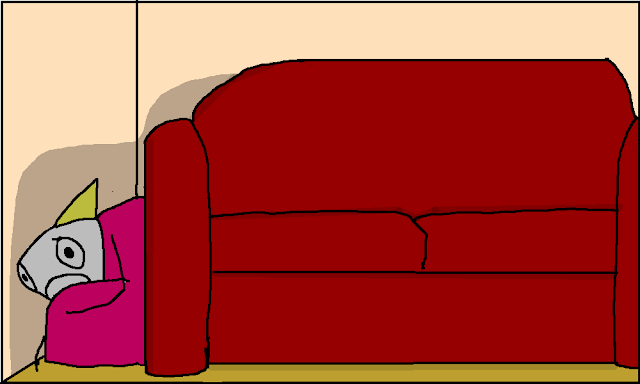I don’t think I’d make a good atheist, for dwelling within me is a strange desire to be happy. This isn’t to say atheists aren’t happy, of course. In fact, most of my atheist friends are a damn sight happier than myself. But the existence of this desire poses a problem.

The desire for happiness is naturally oriented towards eternal happiness. When I am happy, I have no desire for that happiness to end. Such a thing would be inconceivable, directly contrary to the very nature of happiness. Thus we never see a man who, when happy with his wife, can’t wait for the next turn of marriage misery.
If this seems obvious, then I am pleased. But it is also extraordinarily stupid. For we live in a world that practically guarantees that we won’t always be happy. We die, others die, people hurt us, we hurt people, and some days we’re doomed to wake up to a suffocating haze of “You suck, self!” with apparently little cause.
And so we arrive at a disconnect. Our natural desire is not met within the universe we are a part of.
Or take the idea of satisfaction. We constantly set up images of ourselves, saying, “If only I could be x, then I would be satisfied.” If only I could get that job. If only I could publish a book. If only I could move to California and join a yoga commune. Then we get those things and wake up, ready to start our new, satisfied life, and what do we find?
We find what Cormac McCarthy talks about in No Country For Old Men:
You think when you wake up in the mornin yesterday dont count. But yesterday is all that does count. What else is there. your life is made out of the day’s it’s made out of. What else is there? Nothin else. You might think you can run away and change your name and I dont know what all. Start over. And then one mornin you wake up and look at the ceiling and guess who’s layin there?
We think if only I could be successful, then I’d be happy. Then we’re successful, and who are we? The same “I”.
That’s why so many folk’s satisfaction doesn’t involve being something, but rather constantly doing something. If you stake all your desires for satisfaction on being a doctor, you’re taking a mighty risk. For once you’re that doctor, what do you do if you’re not satisfied? You’re screwed! Move on to the next image of your satisfied self.
Better instead to find satisfaction in travel, for you can always travel more. Better to find satisfaction is physical pleasure, because you can always try for more sex, more drugs, more alcohol. Better to find satisfaction in something you do, not in who you are.
Yet what do we say? We want to be satisfied with our selves. We want to be happy with ourself. Like this kid:
This desire for satisfaction is naturally oriented to the eternal. No man wants to be satisfied with himself for a day or two. We want forever. But once again, it seems that our desire to be satisfied with ourselves cannot be met within the universe we live. We get glimpses of it, don’t get me wrong, but how much of our satisfaction is really in the things we do, and not in who we are? It’s a tough question.
This seems to be the case with an unaccountable number of things. We want to love and be loved, and these desires are orientated towards “Forever”. (If a man asks a woman to love him for a month, he doesn’t want her love at all.) But we find it difficult to love, difficult to be loved, difficult to live up to the eternal call love cries. Or take our natural desire to be “one” with things. We want to be one with nature, one with beauty, one with him, one with her, one in mind, one in heart. But the reality is we can never achieve this oneness we desire. The universe dictates that two objects cannot occupy the same space. Bummers all around.
Now here a complaint could be rightfully made: So what? And I suppose it depends. The man who can be fine with this disconnect between what we desire and what we can actually get, well, I imagine he’d make a good, rational, happy atheist, agnostic, or post-Christian-what-have-you. I’d honestly, I’d commend him for it.
But forgive me, for I have a certain weakness that cringes at meeting a seemingly insurpassable wall.
If I have a desire that cannot be met by the natural universe, this seems to imply that there is something in me unnatural.
We have a desire to be eternally satisfied, to be eternally happy, to be one with another, to be eternally loved and eternally love — these desires cannot be met. What then, are we to make of our desire for truth?
When we go about the work of science, we go under the assumption that the desire for truth can be met, for why would we have within ourselves a desire that has no correlation to reality? But if we claim that our desire for eternal happiness cannot be met, and that any thinking to the contrary is delusion, then we seriously call into question the idea that our desire for truth can be met, and that all satisfaction of that desire is any more than just delusion.
If our desires don’t necessarily have objects, than man is absurd creature, and his reasoning cannot be trusted. If his wants can be mere delusions and fantasies, then his attempt to fulfill those wants are suspect. All his work is suspect. His atheism is suspect, his theism, his books and his thoughts.
If however, we look at these desires and believe that they do have objects, then our need to know can be satisfied, as can our need to be forever satisfied can be satisfied. This is the position I cannot help but take. If I have a desire that cannot be met by the natural universe, this seems to imply that there is something in me that yearns something outside of the natural universe. And I do believe these desires can be met “there” — the desire to be one with Another, to be satisfied with myself as precisely who I am, to love and eternally be loved, to be forever happy and to spend my days in perfect peace — for if I don’t, I simply make no sense.
















